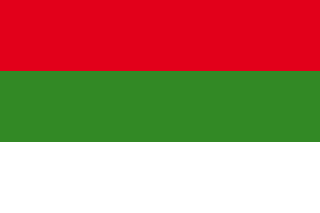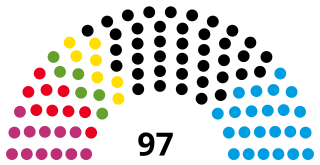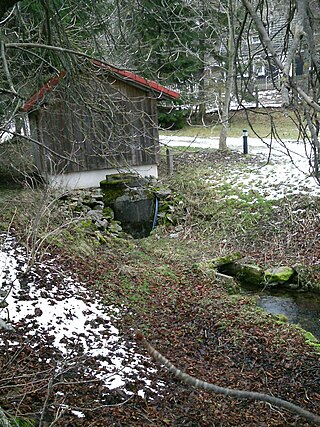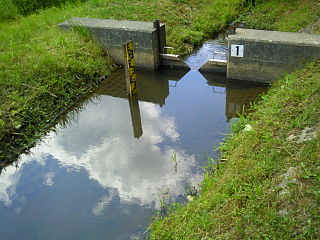The House of Ascania was a dynasty of German rulers. It is also known as the House of Anhalt, which refers to its longest-held possession, Anhalt.

Saxony, officially the Free State of Saxony, is a landlocked state of Germany, bordering the states of Brandenburg, Saxony-Anhalt, Thuringia, Bavaria, as well as the countries of Poland and the Czech Republic. Its capital is Dresden, and its largest city is Leipzig. Saxony is the tenth largest of Germany's sixteen states, with an area of 18,413 square kilometres (7,109 sq mi), and the sixth most populous, with more than 4 million inhabitants.

Saxony-Anhalt is a state of Germany, bordering the states of Brandenburg, Saxony, Thuringia and Lower Saxony. It covers an area of 20,451.7 square kilometres (7,896.4 sq mi) and has a population of 2.18 million inhabitants, making it the 8th-largest state in Germany by area and the 11th-largest by population. Its capital is Magdeburg and its largest city is Halle (Saale).

The Duchy of Anhalt was a historical German duchy. The duchy was located between the Harz Mountains in the west and the river Elbe and beyond to the Fläming Heath in the east. The territory was once ruled by the House of Ascania, and is now part of the federal state of Saxony-Anhalt.
A Verbandsgemeinde is a low-level administrative unit in the German federal states of Rhineland-Palatinate and Saxony-Anhalt. A Verbandsgemeinde is typically composed of a small group of villages or towns.

The Mulde is a river in Saxony and Saxony-Anhalt, Germany. It is a left tributary of the Elbe and is 124 kilometres (77 mi) long.
Central Germany is an economic and cultural region in Germany. Its exact borders depend on context, but it is often defined as being a region within the federal states of Saxony, Thuringia and Saxony-Anhalt, or a smaller part of this region, such as the metropolitan area of Leipzig and Halle plus the surrounding counties.

Benneckenstein is a town in the district of Harz, in Saxony-Anhalt, Germany. Since 1 January 2010, it has been part of the town of Oberharz am Brocken. Benneckenstein is in the eastern Harz, 14 km southeast of Braunlage, and 24 km south of Wernigerode.
Anhalt-Bitterfeld is a district in Saxony-Anhalt, Germany. Its capital is Köthen (Anhalt). Its area is 1,455.1 km2 (561.8 sq mi).
Börde is a district in Saxony-Anhalt in Germany. Its seat is the town Haldensleben. It takes its name from the natural region Magdeburg Börde. It is the site of the Morsleben radioactive waste repository. The disposal of waste into the facility ended in 1998.
Saalekreis is a district in Saxony-Anhalt, Germany. The district seat is Merseburg. Its area is 1,434.2 km2 (553.7 sq mi). It is bounded by the districts Kyffhäuserkreis (Thuringia), Mansfeld-Südharz, Salzlandkreis, Anhalt-Bitterfeld, Nordsachsen, Leipzig and Burgenlandkreis. The district-free city of Halle is surrounded by the Saalekreis.

The Landtag of Saxony-Anhalt is the parliament of the German federal state Saxony-Anhalt. It convenes in Magdeburg and currently consists of 97 members of six parties. The current majority is a coalition of the Social Democratic Party, Free Democratic Party and the Christian Democratic Union, supporting the cabinet of Minister-President Reiner Haseloff.
The Saxony-Anhalt Cup is an annual football cup competition in Saxony-Anhalt. The Football Association of Saxony-Anhalt is its governing body. All non-professional sides that are members of the FSA may participate. Winners of the Saxony-Anhalt Cup will start in the first round of the DFB Cup. The cup final was played in Paul Greifzu Stadium in Dessau from 1998 to 2005. Since then it has been played in Schönebeck (Elbe) in 2006, and in the newly built Stadion Magdeburg since 2007. The cup is played in a one-leg mode, with extra time and penalty shoot-out when necessary. The teams share the revenue from the respective matches, and in the cup final, the Football Association also receives a share. The cup has been played since 1991. Record winners are 1. FC Magdeburg with 12 titles, two of which were won by the club's reserve team. It is one of the 21 regional cup competitions in Germany.

The Evangelical Church in Central Germany is a United church body covering most of the German states of Saxony-Anhalt and Thuringia and some adjacent areas in Brandenburg and Saxony.

The Goldbach is a river of Saxony-Anhalt, Germany. It is a left tributary of the River Bode, about 30 kilometres (19 mi) long, in the Harz Mountains.

The Teufelsgrundbach, also Teufelsbach, is a tributary of the Selke in the Lower Harz in Saxony-Anhalt in Germany. The stream flows through the valley of the Teufelsgrund.
Teufelsbach may refer to the following rivers in Germany:
Schmerlenbach is a river of Saxony-Anhalt, Germany. It flows into the Teufelsbach near Heimburg.
Sven Schulze is a German politician of the Christian Democratic Union (CDU) who has been serving as State Minister for Economic Affairs in the government of Minister-President of Saxony-Anhalt Reiner Haseloff since 2021. He was previously a Member of the European Parliament from 2014 to 2021.








